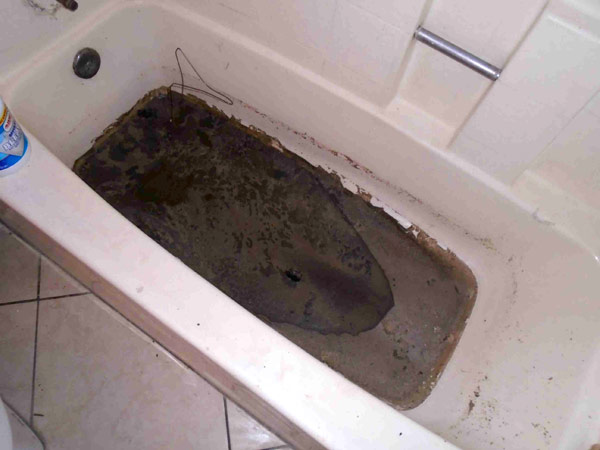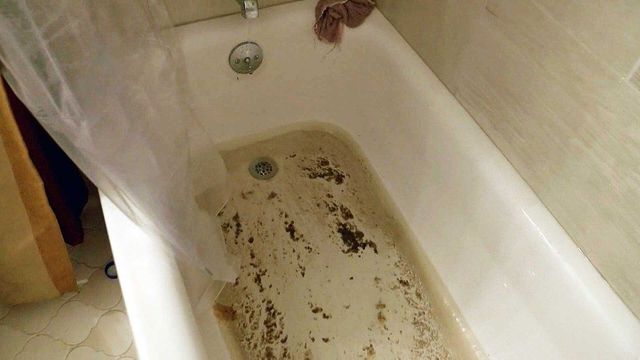What are your thoughts on Why sewage is coming up through your bathtub?

Sewer backup in the tub can be an upsetting and unsanitary issue for any kind of home owner. Not only is it troublesome, yet it likewise postures significant wellness threats and shows underlying problems with the plumbing system. Recognizing why sewer is showing up via the bathtub is essential for taking suitable activity to resolve the issue properly.
Introduction to the Concern
Understanding the Problem
When sewer draws back up into the bath tub, it's a clear indication of a trouble with the drainage system. The wastewater that must be flowing away from your home is instead locating its way back into your home, which can cause substantial damage and health hazards.
Prospective Reasons
A number of aspects can add to sewage back-up in the bathtub. From clogs in the sewer line to issues with the plumbing framework, recognizing the root cause is essential for finding a remedy.
Common Reasons for Sewer Backup
Blockages in the Sewer Line
Among one of the most typical causes of sewer back-up is an obstruction in the sewage system line. This can happen because of the build-up of debris, grease, or international things in the pipes, protecting against correct flow and triggering sewage to back up right into your tub.
Tree Root Intrusion
Tree roots seeking wetness and nutrients can penetrate sewage system lines through little splits or joints. In time, these origins can expand and expand, causing considerable damage to the pipes and leading to sewage backup problems.
Aging Infrastructure
Older homes may have outdated plumbing systems that are much more at risk to deterioration, splits, and damage. As pipes age, they end up being a lot more susceptible to leaks and clogs, raising the likelihood of sewage backup occurrences.
Heavy Rainfall or Flooding
Throughout periods of heavy rainfall or flooding, the sewer system may come to be overwhelmed with excess water, creating back-ups and overflows. This can lead to sewer backing up right into tubs and various other components inside the home.
Health And Wellness Risks Associated with Sewage Back-up
Contamination of Water Supply
Sewage backup can contaminate the supply of water in your home, presenting a significant wellness threat to you and your household. Exposure to contaminated water can lead to stomach concerns, skin infections, and various other diseases.
Spread of Condition
Sewage has dangerous germs, infections, and bloodsuckers that can cause a variety of diseases, consisting of hepatitis, cholera, and gastroenteritis. Entering into contact with sewage or polluted surface areas places you in jeopardy of infection.
Mold and mildew Development
Dampness from sewer back-up can create optimal conditions for mold and mildew development in your house. Mold spores can exacerbate respiratory system problems and create allergic reactions in sensitive people, making punctual clean-up important.
Indicators of Sewer Back-up
Foul Odors
Unpleasant smells originating from drains or components, particularly in the shower room, may indicate sewage back-up problems. These smells are commonly solid and consistent, signifying a problem that calls for prompt interest.
Slow Draining Fixtures
Tubs, sinks, and commodes that drain slowly or otherwise in all could be experiencing sewer backup. If multiple fixtures are influenced all at once, it's likely that the concern stems from an usual factor, such as the primary drain line.
Gurgling Noises
Unusual gurgling or gurgling sounds originating from drains when water is running elsewhere in the house are a sign of air caught in the plumbing system. This air build-up more info can result from sewer click here back-up and need to be checked out promptly.
Immediate Actions to Take
Turning Off Water System
In the event of sewage back-up, it's essential to turn off the water system to avoid additional contamination and damages. Situate the major water shutoff valve in your home and shut it off till the concern can be solved.
Getting In Touch With a Specialist Plumber
Handling sewage back-up is not a do it yourself job. Contact an accredited plumber with experience in taking care of sewage-related problems to assess the circumstance and perform necessary fixings or cleanups.
Avoiding Contact with Contaminated Water
Up until the sewer back-up is dealt with, avoid contact with infected water to avoid the spread of bacteria and pathogens. Put on protective equipment if you must remain in the damaged location and wash your hands completely later.
Safety nets
Regular Maintenance of Drain Lines
Set up regular assessments and maintenance of your sewage system lines to determine and address potential concerns prior to they escalate into major issues. This can include cleaning out particles, evaluating for tree root intrusion, and repairing any damaged pipelines.
Setting Up Backwater Shutoffs
Consider setting up backwater shutoffs in your plumbing system to prevent sewer from receding into your home during durations of heavy rainfall or flooding. These shutoffs instantly close when water draws back up, protecting your home from contamination.
Appropriate Disposal of Household Waste
Prevent purging anything besides toilet paper and human waste down the commode to prevent blockages and obstructions in the sewage system line. Dispose of grease, oil, and other family chemicals properly to minimize the risk of plumbing issues.
Cleaning Up After Sewer Backup
Disinfection Procedures
Extensively disinfect and sterilize affected locations after sewer back-up to remove dangerous bacteria and avoid mold and mildew growth. Use proper cleansing items and safety equipment to guarantee secure and efficient clean-up.
Remediation of Impacted Locations
Repair any kind of damage to flooring, wall surfaces, or components brought on by sewage back-up. Depending on the degree of the damage, you may need to replace carpets, drywall, or various other products to restore your home to its pre-loss condition.
Why Is Water Backing Up in My Bathtub When I Flush My Toilet?
What to do about a sewer line clog
First, don’t bother with plunging. No amount of plunging will dislodge the clog in a sewer line. The clog is too far away. Plungers are for clogs in the toilet itself, not the sewer line. Plus, the most likely causes of a sewer clog are:
Tree roots Flushed toys or feminine products Grease buildup Those items don’t move easily. And in the case of tree roots, the roots need to be cut out of the pipe and the pipe will need to be repaired.
You’ll need a closet auger. A closet auger is a type of plumber’s snake with a protective cover to keep from scratching the delicate porcelain toilet. If the clog is further down, you may need to remove the toilet or use one of your cleanouts to get to the clog.
We also recommend doing a video inspection of the drain to ensure that the cause of the clog has been completely removed. Otherwise, you could have the same problem again in a few days or weeks.
https://mspplumbingheatingair.com/blog/why-is-water-backing-up-in-my-bathtub-when-i-flush-my-toilet

As a serious reader on , I thought sharing that piece of content was sensible. Those who liked our blog post please consider to share it. Thank you so much for taking the time to read it.
Click Here